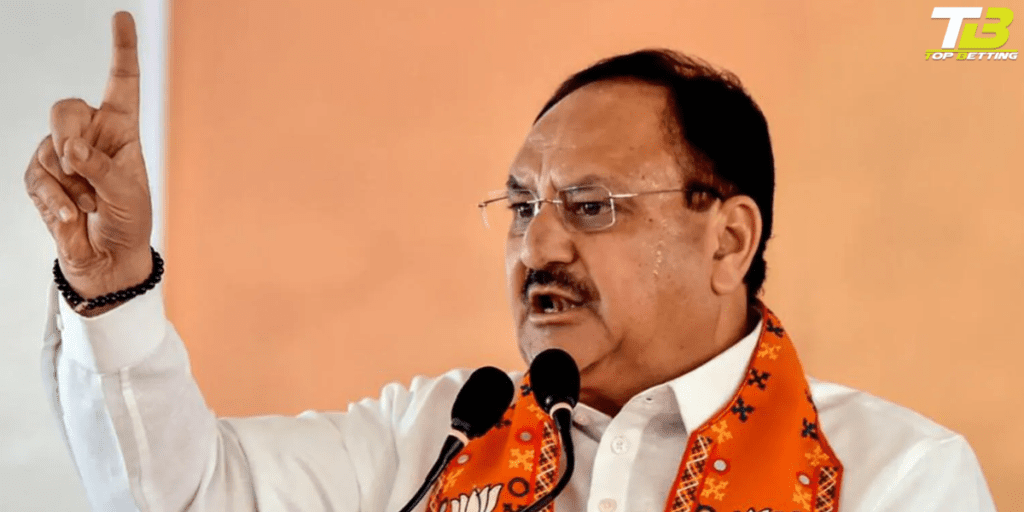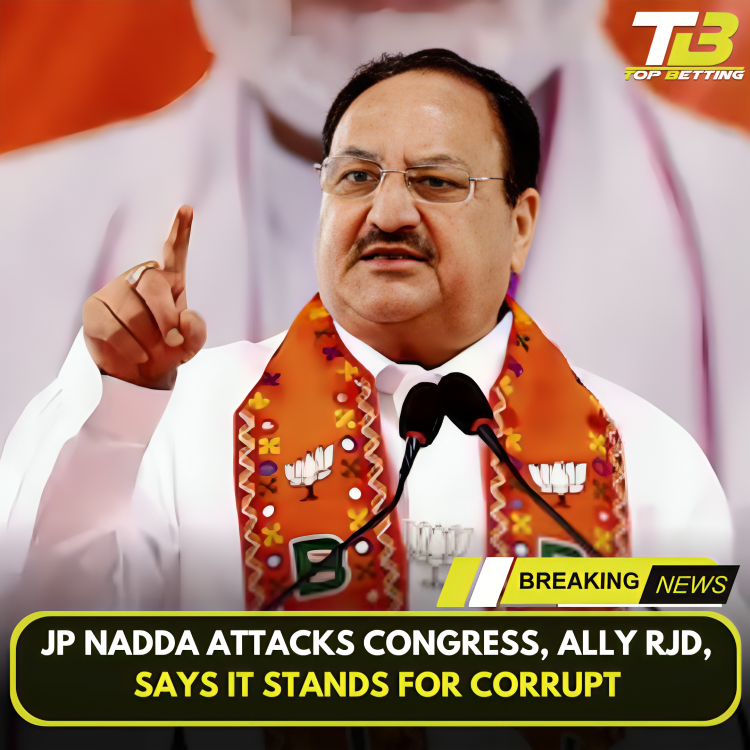
Nadda Slams Congress and RJD, Labels Them Corrupt
In a scathing attack on the Congress and its ally Rashtriya Janata Dal (RJD), Bharatiya Janata Party (BJP) chief JP Nadda has accused them of being synonymous with corruption, chaos, and misgovernance. Nadda emphasized the BJP’s commitment to the development and prosperity of the people, in stark contrast to the self-serving nature of these parties. His remarks were made during his campaign in Bihar’s Araria, where he highlighted the BJP’s dedication to good governance and the welfare of the common man.
Congress and RJD: Parties of Families
Nadda did not mince his words in describing the Congress and RJD as parties that prioritize the interests of their own families above the welfare of the nation. He criticized their dynastic politics, pointing out that they have a long history of nepotism and favoritism. The BJP chief underscored the distinction between these parties and the Narendra Modi-led NDA government’s focus on benefiting the poor through effective governance.
Corruption Allegations and Jungle Raj
Labeling the Congress and RJD as “rishwatkhor” (corrupt), JP Nadda highlighted the deep-rooted corruption within these parties. He accused them of perpetuating a culture of corruption and misusing their power for personal gains. The BJP chief also cited the infamous “jungle raj” (lawlessness) that plagued Bihar during the RJD’s tenure, emphasizing that the state cannot afford to return to such a chaotic era.
Congress and RJD: Anti-Ram and Anti-Nation
Nadda’s criticism of the Congress and its allies, particularly the RJD, for their stance against the construction of the Ram temple in Ayodhya underscores the ideological divide between the BJP and these parties. By applauding Prime Minister Modi’s role in fulfilling the aspirations of millions of Hindus through the temple’s construction, Nadda aimed to position the BJP as the true custodian of Hindu interests and values.
The construction of the Ram temple in Ayodhya was a significant milestone for many Hindus in India, representing the culmination of a long-standing cultural and religious sentiment. Nadda’s remarks strategically highlighted the BJP’s proactive approach in addressing Hindu sentiments and priorities, contrasting it with what he portrayed as anti-Ram sentiments within opposition parties like the Congress and RJD.
This narrative is intended to resonate with Hindu voters who prioritize religious and cultural issues, framing the BJP as a defender of their beliefs and aspirations. Nadda’s remarks underscore the BJP’s broader ideological stance, emphasizing its commitment to Hindutva principles and the cultural ethos of India, particularly in contrast to parties perceived as opposing these values. The rhetoric aims to draw clear distinctions between political ideologies and appeal to voters aligned with Hindu nationalist sentiments.
BJP’s Commitment to Development and Prosperity
Nadda underscored the BJP’s unwavering dedication to public welfare, emphasizing a core focus on development and prosperity. He pointed to key initiatives spearheaded by the Modi government, including the implementation of the Covid-19 lockdown and the highly successful vaccination campaign. These efforts, according to Nadda, exemplify the BJP’s commitment to effective governance and improving the quality of life for ordinary citizens.
The Covid-19 lockdown, implemented to curb the spread of the virus, showcased the government’s resolve in prioritizing public health and safety. Additionally, the successful execution of the vaccination drive highlighted the BJP’s capability in handling large-scale healthcare interventions, ultimately safeguarding lives and livelihoods.
Nadda’s emphasis on development and prosperity aligns with the BJP’s overarching vision of inclusive growth and economic advancement. By emphasizing these achievements, Nadda aimed to reinforce the party’s track record of governance centered on tangible outcomes that positively impact the lives of citizens across the nation.
The BJP’s commitment to uplifting the common man through strategic policy interventions and effective governance underscores their broader narrative of progress and transformation. Nadda’s statements aimed to resonate with voters by highlighting the tangible benefits of the party’s governance approach, ultimately bolstering support for the BJP’s development agenda.
Reservation Based on Religion
In his remarks, Nadda criticized the Congress-led alliance for allegedly advocating reservation based on religion, which he argued contradicts the principles of equality and secularism. Nadda emphasized the importance of meritocracy and equal opportunities for all citizens, advocating for reservation policies that prioritize socio-economic factors over religious affiliation.
By positioning reservation within the framework of socio-economic conditions, Nadda aimed to resonate with a broad electorate that values fairness and inclusivity. His statements likely sought to portray the BJP’s stance as aligned with principles of equality and secular governance, contrasting it with what he perceives as divisive policies promoted by the opposition.
Nadda’s comments reflect a broader political discourse around reservation policies in India, where affirmative action programs are often a topic of debate and contention. The issue of reservation based on religion remains sensitive in the country, where secularism is constitutionally enshrined. Nadda’s stance underscores the BJP’s commitment to merit-based opportunities and socio-economic upliftment as pillars of their governance approach, appealing to voters who prioritize these values in shaping policy decisions.

Conclusion
JP Nadda’s scathing attack on the Congress and RJD highlights the ideological differences between these parties and the BJP. He accuses them of corruption, misgovernance, and prioritizing their own families over the nation’s welfare. Nadda emphasizes the BJP’s commitment to development, good governance, and the upliftment of the common man. As the election season heats up, it remains to be seen how these political dynamics will shape the future of Bihar and Indian politics as a whole.










